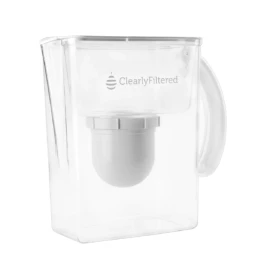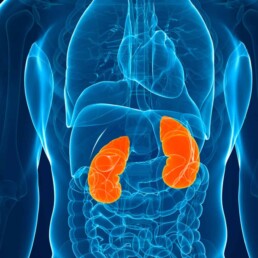Coenzyme Q10 (CoQ10), also known as ubiquinone, is an often forgotten about fat-soluble nutrient and key factor in optimizing kidney health. It can be made by our own cells when there are adequate resources, however it is also available through diet and as a supplement. In this blog we will discuss the association between CoQ10 and kidney health.

That said, CoQ10 is abundant in the most metabolically active tissue, which includes the heart, kidney, and liver. The concentration of CoQ10 in the kidneys are second only to the amount found in heart muscle. This makes perfect sense since these tissues would need the most energy. We would also expect that dysfunction in the production of CoQ10 would be linked with diseases of these organs.
The tubules of the kidneys are especially high energy consumers. They are involved in reclaiming many electrolytes and minerals lost during the filtration process by the kidneys. Therefore, they have a high concentration of mitochondria and high requirement for CoQ10.
The table below outlines all the ways that CoQ10 deficiency impacts health (those linked with kidney disease complications are emphasized):
CoQ10 is a powerful antioxidant, which prevents the generation of free radicals responsible for damage to proteins, lipids, and DNA causing disease. In disease conditions connected with reactive oxygen species (ROS), like cardiovascular disease, diabetes, and kidney disease, the concentration of CoQ10 in the body is lower.
This is because the decline in production/circulation of CoQ10 leads to dysfunction of energetic production, which in turn decreases the efficiency of cells. To protect the cells against ROS, humans have evolved a highly complex antioxidant system, which includes CoQ10, glutathione, vitamin E, to name a few.
How is Coq10 related to kidney health?
Most of the body’s daily CoQ10 requirements come from endogenous synthesis, which is known to decline with age. Inflammatory mediators associated with kidney disease include C-reactive protein (CRP), interleukin-6 (IL-6) and tumor necrosis factor alpha (TNF-alpha) have also been shown to be reduced when deficient CoQ10 levels are corrected, indicating there’s a correlation between CoQ10 and inflammatory factors. The damage is thought to be mediated by the activity of nuclear transcription factor NF-kappa beta (NF-KB).
Decreased CoQ10 levels may be in particular an issue in Chronic Kidney Disease (CKD) patients prescribed statins. The kidney relies on a large amount of CoQ10 and ATP production in order to do its job of removing uremic toxins. Since CoQ10 depletion is a known side effect of statin therapy, it has been suggested that these patients have underlying mitochondrial disease leaving them more susceptible to the adverse effects of statin therapy.
Although hemodialysis is essential for removing uremic toxins in advanced stages of CKD, a consequence of the procedure is that patients are subject to additional oxidative stress (a result of neutrophil exposure to the synthetic material comprising the dialyzer membrane), in addition to the oxidative stress associated with CKD to begin with.
Furthermore, patients with CKD are at high risk of developing cardiovascular disease (CVD) compared to those without CKD. In fact, approximately 50% of CKD mortalities are a result of CVD and not a direct consequence of kidney failure. At the same time, CVD promotes CKD contributing to a vicious cycle.
Improving levels of CoQ10 resulted in improvements in blood cholesterol, markers of CV risk as a result of oxidative stress and therefore improves progression of CKD as a secondary end point. Furthermore, CoQ10 levels are associated with two other risk factors for CVD, higher epicardial fat thickness and low coronary flow reserve, a marker for atherosclerosis were found to be associated with reduced plasma CoQ10. Lastly, CoQ10 is significantly lower in hemodialysis patients, like many micronutrients.
Drug and Nutrient interactions Impacting CQ10 Deficiencies
CoQ10 deficiency is attributed to increased need outpacing production/supply due to mitochondrial dysfunction and/or increased oxidative stress exhausting antioxidants like CoQ10. As mentioned earlier, the increased demand in CKD due to elevations in uremic toxins and ROS is a drain on stores of CoQ10.
Coupled with dietary factors that affect consumption or absorption of foods rich in CoQ10 and cofactors needed to endogenously produce the nutrient, there are other influences to consider. For one, associations between drugs and nutrient deficiency are well documented. Drugs implicated with Drug-Induced Nutrient Depletion (DIND) of CoQ10 include beta-blockers, gemfibrozil, statins, warfarin, as well as certain chemotherapy and HIV medication.
Conversely, certain nutrients have been associated with improved efficiency. For example, carnitine, when co-administered, improves the efficacy of both CoQ10 and carnitine and improved circulation and protect the cardiac muscle. Another example is the synergistic antioxidant and antiinflammatory effect when CoQ10 is combined with vitamin E repletion. Furthermore, depletions in nutrients required for the production of endogenous CoQ10 will also affect the cellular production of CoQ10 via the Electron Transport Chain (ETC). These nutrients include iron, niacin (B3), vitamins B2, and B6.
Sources of CoQ10 (food and supplements, positive nutrient interactions)
Food sources of CoQ10 include:
· Meat and poultry, particularly organ meat and eggs.
· Fatty fish like Trout, herring, mackerel, and sardines.
· Legumes, especially soybeans, lentils and peanuts,
· Nuts and seeds, especially pistachios and sesame seeds
· A handful of fruits and vegetables that include strawberries and oranges, spinach, cauliflower, and broccoli)
Summary of Benefits of ensuring adequate CoQ10 on Kidney Disease
Adequate CoQ10 levels have been shown to be beneficial to slow progression of CKD by addressing direct and indirect factors:
· Improved Lipid profile (total cholesterol and LDL)
· Improved insulin sensitivity, glycemic control, and vascular dysfunction in type II diabetes
· Antioxidant protection from Inflammation
· Energy production in metabolically active tissue of the kidney








